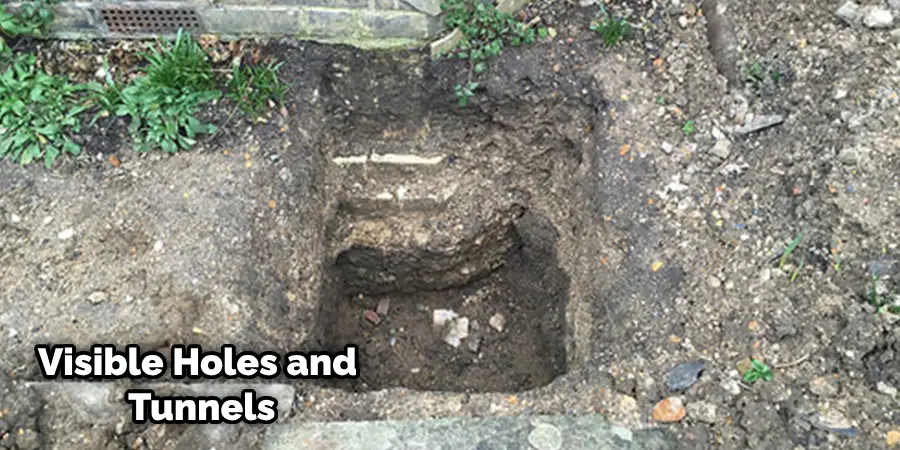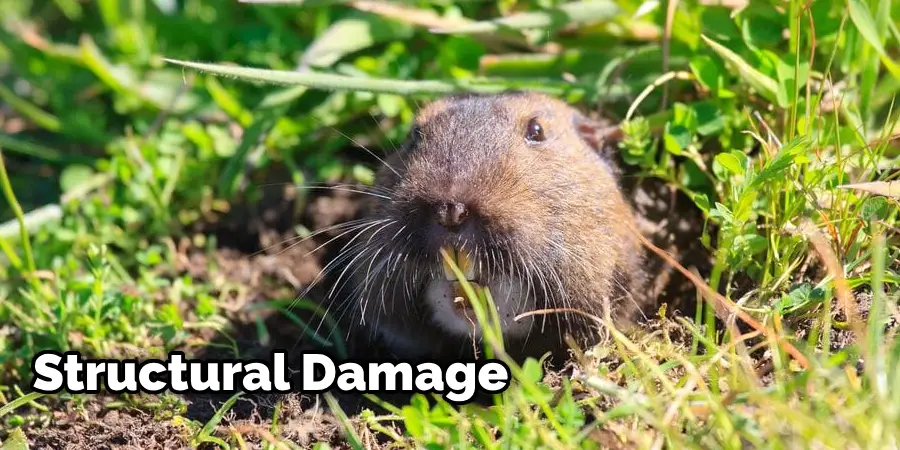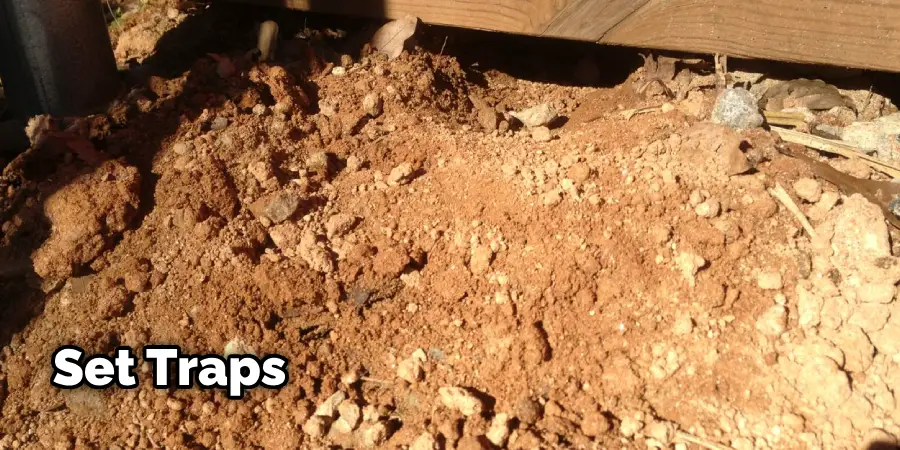Are you having a rodent problem? Do you think you have critters digging under the siding or foundation of your home? Don’t worry – plenty of homeowners have found themselves in this same situation.

There are many different steps to take in order to get rid of these pesky little creatures, and with a bit of patience and effort, you, too, can protect your house from rodents.
In this blog post, we’ll cover various strategies for stopping them from gaining access to the space beneath your foundation. Read on for helpful tips on how to stop rodents from digging under foundation.
Understanding the Behavior of Rodents
Before we dive into the steps to prevent rodents from digging under your foundation, it’s crucial to understand their behavior and motivations.
A. Types of Rodents Commonly Involved in Digging
There are several types of rodents that could be causing havoc to your house’s foundation:
- Rats: Known for their excellent digging capabilities, rats are often the culprits behind holes beneath a home’s foundation. We have a detailed blog post for this issue you can check it out here.
- Mice: Although smaller than rats, mice are adept climbers and borrowers, sometimes accessing homes from beneath the ground.
- Squirrels: While squirrels are typically associated with trees, some species are known to burrow, especially ground squirrels.
B. Reasons Rodents Dig Under Foundations
These critters have a few common reasons for digging under your home:
- Shelter: Foundations provide a safe haven from predators and harsh weather conditions, making them an attractive shelter for rodents.
- Food Sources: If your home or its surroundings offer easily accessible food, rodents are likely to burrow as it provides close proximity to these resources.
- Nesting: Foundations can provide a secluded and secure place for rodents to build nests and reproduce.
Signs of Rodent Infestation
1. Visible Holes and Tunnels

One of the most obvious signs of rodents digging under your foundation is visible holes or tunnels in the soil around your home.
2. Scratching or Chewing Sounds
You may also hear scratching or chewing sounds coming from beneath the foundation, which indicates rodent activity.
3. Rodent Droppings
Finding droppings in and around your home is a clear indication of a rodent infestation. These droppings are typically small, dark, and pellet-shaped.
4. Damage to Property
Rodents can cause damage to your home’s foundation, insulation, wires, and pipes as they burrow their way through.
5. Unusual Pet Behavior
If you have pets, they may start exhibiting strange behavior, such as sniffing or pawing at certain areas of the foundation, which could indicate a rodent presence.
Potential Risks of Rodent Infestation
1. Structural Damage

Rodents can cause severe damage to the foundation and structure of your home, potentially compromising its stability.
2. Health Risks
These critters are known to carry diseases and parasites that can be harmful to humans, especially if they come into contact with food or water sources.
3. Fire Hazards
Rodents are known to chew on wires, potentially causing electrical fires and endangering your home and family.
How to Stop Rodents from Digging Under Foundation: 9 Step-By-Step Guide
Step 1: Identify and Seal Entry Points
The first step in preventing rodents from digging under your foundation is to seal all potential entry points. These can include small gaps or cracks in the foundation, siding, or windows.
Step 2: Install Wire Mesh
For existing holes or openings where rodents may be entering, install wire mesh to prevent them from accessing your home’s interior.
Step 3: Clear Debris and Vegetation
Remove any debris or vegetation around your home’s foundation, as these can provide hiding spots and food sources for rodents.
Step 4: Keep Food Sources Sealed
Make sure to store food in airtight containers and clean up any spills or crumbs immediately. This eliminates potential food sources for rodents.
Step 5: Use Natural Deterrents
There are several natural deterrents for rodents, such as peppermint oil and hot pepper flakes, that can be sprayed around the perimeter of your home to discourage them from digging.
Step 6: Set Traps

Traps can be an effective way to catch rodents and prevent further damage. Make sure to check and reset them regularly.
Step 7: Remove Existing Rodents
If you have already identified a rodent infestation, it’s crucial to remove them before implementing preventive measures.
Step 8: Block Off Access to Crawl Spaces
Consider covering crawl space openings with wire mesh or concrete blocks to prevent rodents from entering your home through these spaces.
Step 9: Seek Professional Help
If the infestation is severe or you are unable to handle it on your own effectively, seek the help of a professional pest control service.
Eliminating Attractants
Keeping your surroundings clean and ensuring proper storage of food can significantly curb the attraction for rodents around your dwelling. Here are some ways to eliminate common attractants:
A. Proper Waste Management
Effective waste management is a key element in deterring rodents, as these creatures are often attracted by the smells emanating from trash and debris.
- Secure Garbage Bins: Make sure that your garbage bins are secured with tight-fitting lids. This prevents rodents from accessing the contents and keeps the scent of garbage contained.
- Regular Removal of Debris: Regularly clean up any debris, such as fallen leaves or leftover food, from your yard. Such materials can offer hiding places and food sources for rodents.
B. Storing Food Properly
Proper food storage is essential in preventing a rodent infestation.
- Sealed Containers: Store all food, including pantry staples and fresh produce, in sealed containers that rats and mice can’t easily access. This includes pet food, which should also be stored in sturdy, sealed containers.
- Pet Food Management: Avoid leaving pet food out in the open. If necessary, feed your pets at specific times and clean up any leftover food immediately to avoid attracting rodents.
Tips on Maintaining a Clean and Tidy Environment
1. Declutter Regularly
Make it a habit to declutter your home regularly. This not only keeps your living space tidy but also eliminates potential hiding spots for rodents.
2. Sweep and Vacuum Often
Sweeping and vacuuming can help remove crumbs, food particles, and debris that may attract rodents.
3. Wipe Down Surfaces
Regularly wipe down kitchen counters, tables, and other surfaces after preparing food or eating to eliminate any remnants that may attract rodents.
4. Clean Up Pet Areas
If you have pets, make sure to clean up their living areas regularly, including their feeding bowls and litter boxes.
5. Seal Cracks and Holes
Inspect your home for any cracks or holes in the walls, floors, or foundation, and seal them promptly to prevent rodents from entering.
6. Properly Store Firewood
If you have a fireplace or wood-burning stove, make sure to store firewood at least 20 feet away from your home and elevate it above the ground.
7. Trim Back Vegetation
Make sure to regularly trim back any vegetation, such as bushes or tree branches, that touch your home’s exterior. This eliminates potential routes for rodents to enter.
8. Regular Pest Inspections
Schedule regular pest inspections to catch any potential infestations early and prevent them from escalating. This will help identify any areas that may need further attention in terms of rodent prevention.
By maintaining a clean and tidy environment, you can greatly reduce the risk of rodents digging under your foundation and causing damage to your home.
Environmental Modifications for Rodent Prevention
Aside from sealing entry points and eliminating attractants, there are other environmental modifications that can be implemented to prevent rodents from digging under your foundation further.
1. Installing Fencing
Installing fencing around the perimeter of your property can act as a barrier against rodents. Make sure to choose sturdy materials and bury the bottom of the fence at least 12 inches underground to prevent burrowing.
2. Using Motion-Activated Sprinklers
Motion-activated sprinklers can startle and deter rodents from entering your property. They are also environmentally friendly as they use water instead of harmful chemicals.
3. Consider Companion Planting
Certain plants, such as mint and marigolds, have natural repellent properties that can help keep rodents away when planted around the perimeter of your home.
4. Keep Your Lawn Mowed
Tall grass and overgrown vegetation can provide hiding spots for rodents, so it’s essential to mow your lawn regularly to keep it short.
Implementing these environmental modifications in combination with other preventive measures can greatly reduce the chances of a rodent infestation under your foundation. It’s important to be diligent and regularly inspect your home for any potential entry points or attractants.
Considering Professional Assistance
If you have implemented preventive measures and are still experiencing issues with rodents digging under your foundation, it may be time to seek professional assistance. A pest control expert can help identify the root cause of the problem and provide practical solutions to eliminate the issue.
They can also offer ongoing maintenance services to ensure your home remains free from rodent infestations. Don’t hesitate to seek professional help if needed, as it can save you time, money, and potential damage to your home. With these tips and preventive measures in place, you can effectively prevent rodents from digging under your foundation and protect your home from potential damage.
Conclusion
In conclusion, rodent infestation is a serious concern that can cause significant damage to your home’s foundation. However, by implementing strategies such as proper waste management and food storage, maintaining a clean environment, making smart environmental modifications, and considering professional assistance, you can effectively deter rodents from your property. Remember, consistency is key in these efforts. It’s far easier to prevent an infestation than to deal with one. With vigilance and the right measures in place, you can keep your home safe from the potential damage brought by these unwelcome guests.

